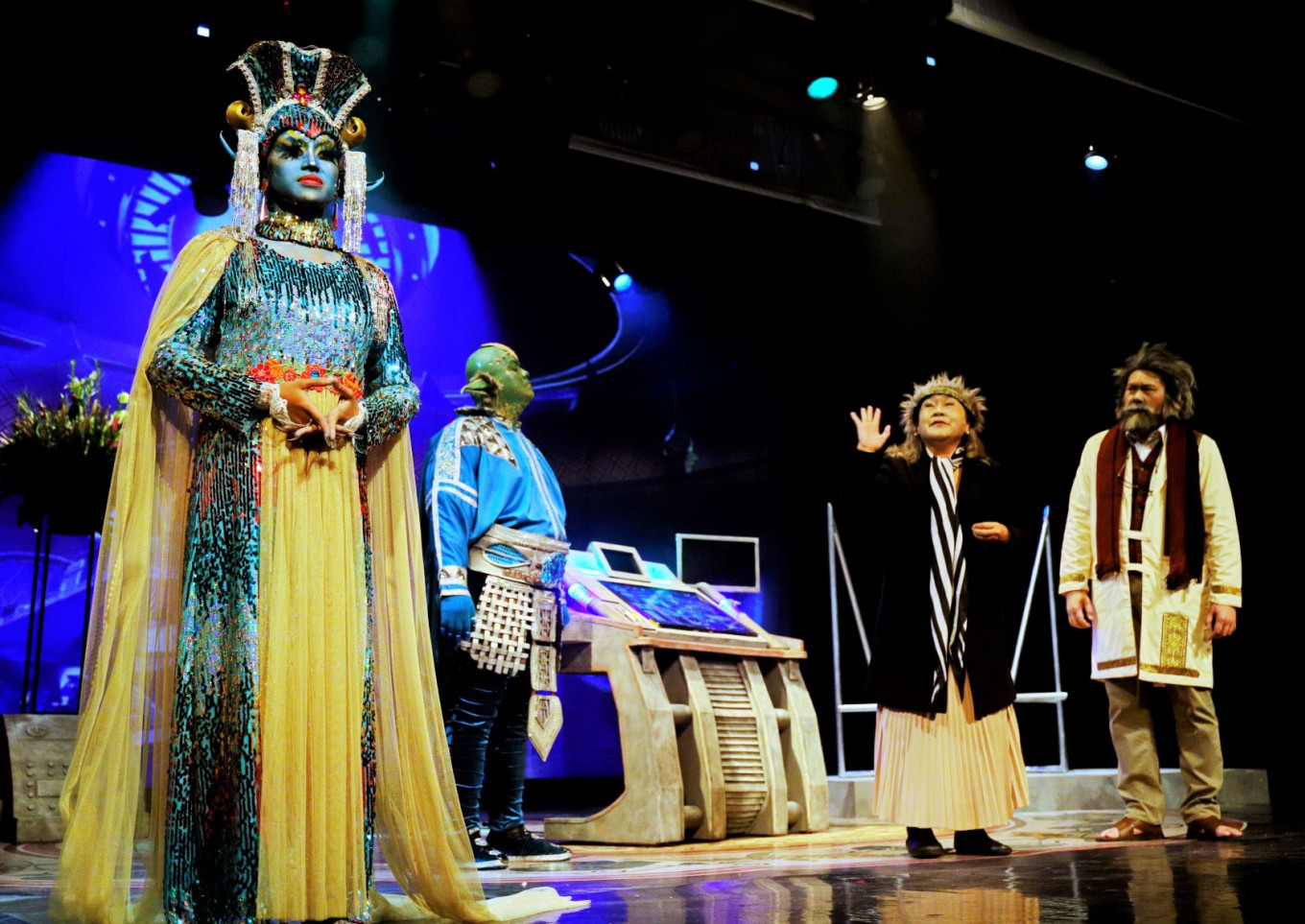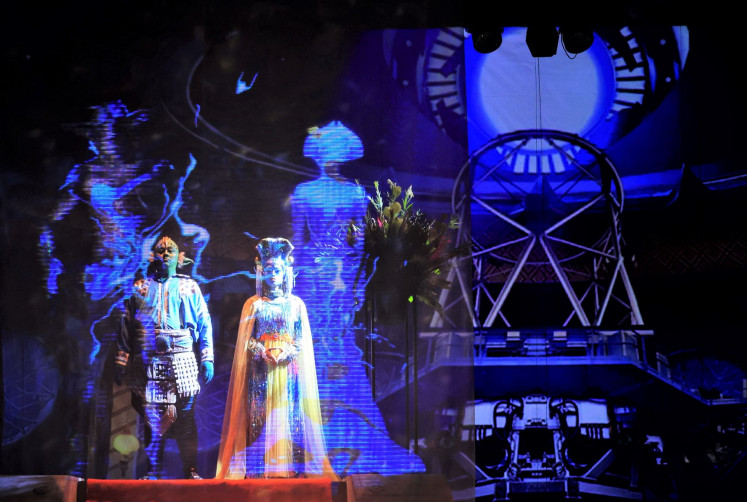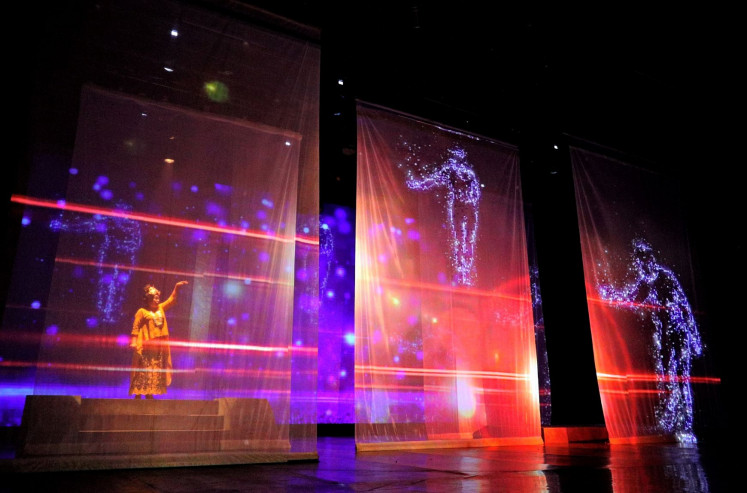Popular Reads
Top Results
Can't find what you're looking for?
View all search resultsPopular Reads
Top Results
Can't find what you're looking for?
View all search results‘Cinta Semesta’: Poetic closure of a waiting game called love
Teater Koma moves on from a classic romantic tale to an intergalactic love story to close the year.
Change text size
Gift Premium Articles
to Anyone
E
verything was all set, but the start of the COVID-19 outbreak in early March forced theater group Teater Koma to postpone, twice, the staging of its most popular play Sampek Engtay – supposedly to open its yearly program in two weeks’ time.
Although the adaptation of a tragic love story from China — also known as The Butterfly Love — has been rescheduled to January, Teater Koma took the challenge to create and deliver a completely new production.
And it was well delivered.
Cinta Semesta, which can roughly translate as “universal love” or “love the universe” as the play carries both notions, is the final part of the Gemintang (Stars) trilogy first staged in 2018.
Director Idries Pulungan said the group decided to produce Cinta Semesta instead of the second installment titled Galaksi (Galaxy) because of the messages it carried that rang true to the current situation.
“The global pandemic should remind us not to fight the universe and to mess with nature. Let us love the universe we live in,” he said in a press conference one day prior to the live stream of Cinta Semesta on Dec. 12 and 13 through LoketLive and Go-Play.
Teater Koma resident Sari Madjid added that the love messages in the story, quoting the group’s patron and playwright Norbertus “Nano” Riantiarno, were also addressed to people’s capability to get through troubled times with love.
“It is a difficult time for everyone and we can’t go through it alone. Let’s take care of the people around us, our neighbors, and for the government to show us love by making sure that the relief aid and policies are in place.”
Love is in the air: Earth scientists Arjuna (Rangga Riantiarno, left) and Chan Lan Nio (Sari Madjid) are seen in a scene of 'Cinta Semesta' (Universal Love). (Courtesy of Teater Koma/Image Dynamics)Written by Nano, the story is set in 2049 and revolves around aging scientists Arjuna Wibowo, played by his son Rangga Riantiarno, and Chan Lan Nio, played by Sari Madjid.
The two characters meet during their youth 50 years ago while taking part in an intergalactic alliance to fight aliens planning to conquer the universe.
From China, Chan Lan Nio falls for the Indonesian man and thus relinquishes her citizenship to be able to stay by his side in a planetarium in Lembang, West Java.
It is unrequited love for her because Arjuna is already in a romantic affair with a warrior from the planet Ssumvitphphpah, Sumbadra (Bunga Karuni), Arjuna’s affectionate nickname for Ssumphphwttsspasbazaliapahssttphph.
In the Mahabharata epic, warriors Arjuna and Sumbadra are a fated romantic couple.
The conflict starts when Her Majesty Saspikaratumakasih (Sekar Dewantari) from Planet Pispakanakasssuah and her right-hand man Ababakababa (Hengky Gunawan) visit the planetarium to inform Arjuna the latest news about Sumbadra.
The queen, who wishes to be called Kasih, reveals that Sumbadra is betrothed to her planet’s prince, who recently died in a battle. His death, according to the queen, elevates Sumbadra to to the highest rank in the military command, making it impossible for her to return to Arjuna.
While Arjuna worries about what to say to Sumbadra the next time they meet, Chan Lan Nio suspects the queen is flirting with Arjuna and pushes him to choose between the three women.
Will he choose a woman from a planet on which three weeks' time is equal to half a century on planet Earth, or the woman who, like a moon, has revolving around him and waiting for his love?
The story carries the more philosophical notion of Albert Einstein’s theory of special relativity, which would make the audience question whether love was a prisoner of time or whether it could actually bend time.
The 99-minute play – super short compared to the usual two to three hours – happily ends with a wedding party attended by guests from different planets appearing in holograms.
Cinta Semesta was the last trip for Teater Koma in its digitization journey this year, during which it invested in digital technology to craft a substitute for the live stage performance.
Strictly following health protocols, the pre-recorded play only involved a minimum number of crew members and five actors, plus vocal coach Naomi Lumbangaol to act as the singing narrator at the opening and the closing acts.
Magical stage: Celebrated theater troupe Teater Koma continues to explore new formats for its performances in digital platforms, using multimedia effects for its latest production 'Cinta Semesta' (Universal Love). (Courtesy of Teater Koma/Image Dynamics)The shooting took place on the stage of Gedung Kesenian Jakarta (GKJ) playhouse, whose size enabled the director and the visual team to use simultaneous shots from various angles and a set of multimedia technology.
Aside from the visual effects and lightings fit for a futuristic set that Teater Koma had applied to their other performances a few years back, Cinta Semesta itself offers a new experience in watching a play.
It holds on to the unwritten rules of a play in which the audience may view the whole stage without obstruction – the only difference is that the audience can even see from the above looking down on the acting area.
And if a stage play requires grandeur, often exaggerating, gestures from the actors, in the digital format, the audience can see their facial expressions – a light smile or a look of amusement crossing their faces, the smallest details that may go unnoticed on stage.
As the scenes are dominated by Arjuna and Chan Lan Nio, the characters aged 80 and 75 respectively, the acting arena is a bit quiet as they don’t roam much around the stage. However, their static presence serves as a balance to the stage when the visual effects are played around their surroundings.
For the trilogy, the actors have also contributed to the play by inventing a sign language that may represent the name of a person or an alien, a word and even a phrase.
These small and intimate gestures, although designed as a means of communication among the intergalactic walkers, have become a point of interest throughout the play and somehow emphasize Teater Koma’s successful transformation.
On that note, the long dialogs can feel redundant as they can be replaced by the details in the movement or visual effects only made possible in the digital format.
Coproducer Rasapta Candrika said Teater Koma was building its existence online during the pandemic through the release of short plays and music videos of the troupe’s songs – sung by professionals or the original actors – and by taking part in the online weekly theater program #NontonTeaterdiRumahAja by Bakti Budaya Djarum Foundation.
“The play is more of an experiment as we are exploring the digital format for our performances,” he said. “We will always stay true to our name, which means an endless continuation. The pandemic can’t stop us.” (ste)














